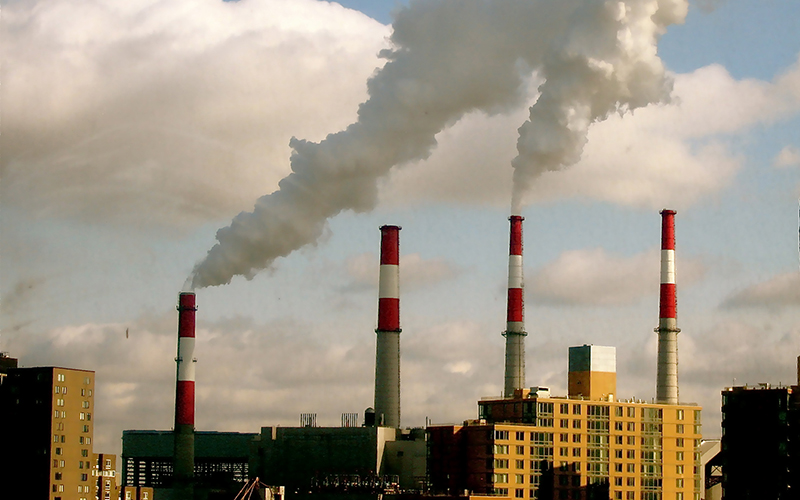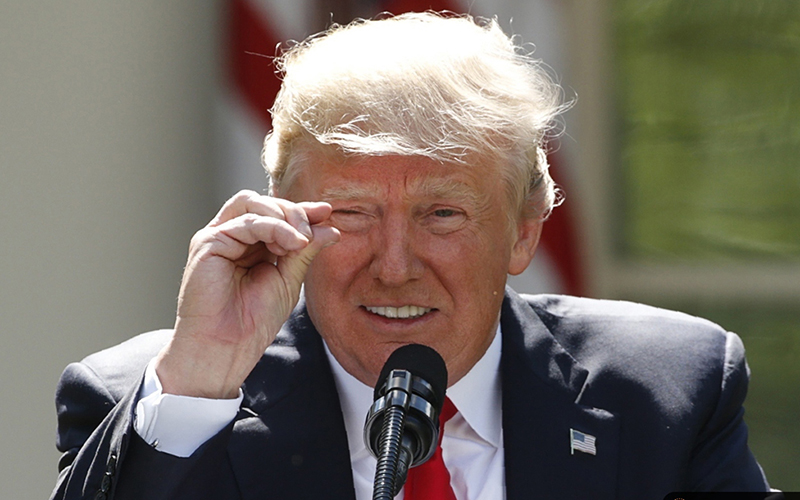
The 2015 multination climate change agreement that President Donald Trump pulled the U.S. out of this week is aimed at reducing greenhouse gas emissions to stem the effects of climate change. (Photo by Wladimir Labeikovsky/Creative Commons)

President Donald Trump, in a Rose Garden announcement Thursday, indicates how much temperature change he thinks will come from a costly multination climate agreement that he said he is going to pull the U.S. out of. (Photo by Kevin Lamarque/Reuters)
WASHINGTON – Arizona cities Friday spurned President Donald Trump’s plan to pull the U.S. out of a global emissions compact, with at least three mayors pledging their cities would hew to the emission goals laid out in the Paris accord.
Tucson and Flagstaff joined Phoenix in a letter that had been signed by 175 mayors – and counting – as of Friday evening, three times as many as had signed a day earlier.
“We will intensify efforts to meet each of our cities’ current climate goals, push for new action to meet the 1.5 degrees Celsius target, and work together to create a 21st century clean energy economy,” said the letter by the group, Climate Mayors. “The world cannot wait – and neither will we.”
The action comes months after city council members in Flagstaff, Mesa, Tucson, Surprise and Tempe signed an open letter from the National League of Cities in March urging the president not to pull out of the climate agreement.
But Trump did just that Thursday, making good on a campaign pledge by withdrawing the U.S. from the 2015 climate pact that he said would cost U.S. jobs for negligible climate improvements. The deal had been agreed to by every country in the world except Nicaragua and Syria – and now the U.S.
The so-called Paris climate accords set goals for reducing emissions across the globe to stem the predicted effects of global warming. But in remarks Thursday in the Rose Garden, Trump argued the agreement was too burdensome to the American people for too small an improvement to the climate, adding that his first priority has to be to look out for the interest of the United States.
But in the National League of Cities letter in March, council members warned of what they call the destructive effects of climate change on municipal governments.
“Extreme weather events such as heat waves, droughts, heavy downpours, floods and other storms, which have become more frequent and more severe, have brought renewed attention to the need for cities to anticipate, prepare for and adapt to their impacts,” the letter said.
Officials from those cities, and from other cities and counties around the state, did not immediately respond to requests for comment Friday on the president’s announcement.
But in a statement Thursday from the U.S. Conference of Mayors, Phoenix Mayor Greg Stanton – who heads the group’s environment committee – praised the Paris climate deal as a step in the right direction.
“The U.S. Conference of Mayors is a strong proponent of the need to address climate change and we support the Paris agreement, which positions the world’s nations, including the United States, to be energy independent, self-reliant, and resilient,” Stanton said in the statement.
Political reaction to the president’s announcement was swift, and predictable, with Democrats blasting it Thursday as dangerous and many Republicans praising the president for sticking to his guns and standing up for U.S. sovereignty. But reaction from business groups in Arizona, on both sides of the issue, was muted Friday.
Trump specifically cited the potential to save jobs in the coal industry by voiding the Paris agreement. But solar companies said they are confident their industry will remain unaffected by the president’s action.
“We supported the Paris agreement when it was signed and still believe the U.S should be engaged,” said Dan Whitten, a spokesman for the Solar Energy Industry Association. “However, we expect America’s solar industry to continue to create jobs, boost the economy and reduce greenhouse gas emissions whether we are a part of the accord or not.”
Tempe-based First Solar, which operates one of the world’s largest power plants, declined to comment on the president’s decision. Other renewable energy firms that were contacted Friday did not respond to requests for comments.
– Cronkite News reporters Brianna Stearns and J.T. Lain contributed to this report.